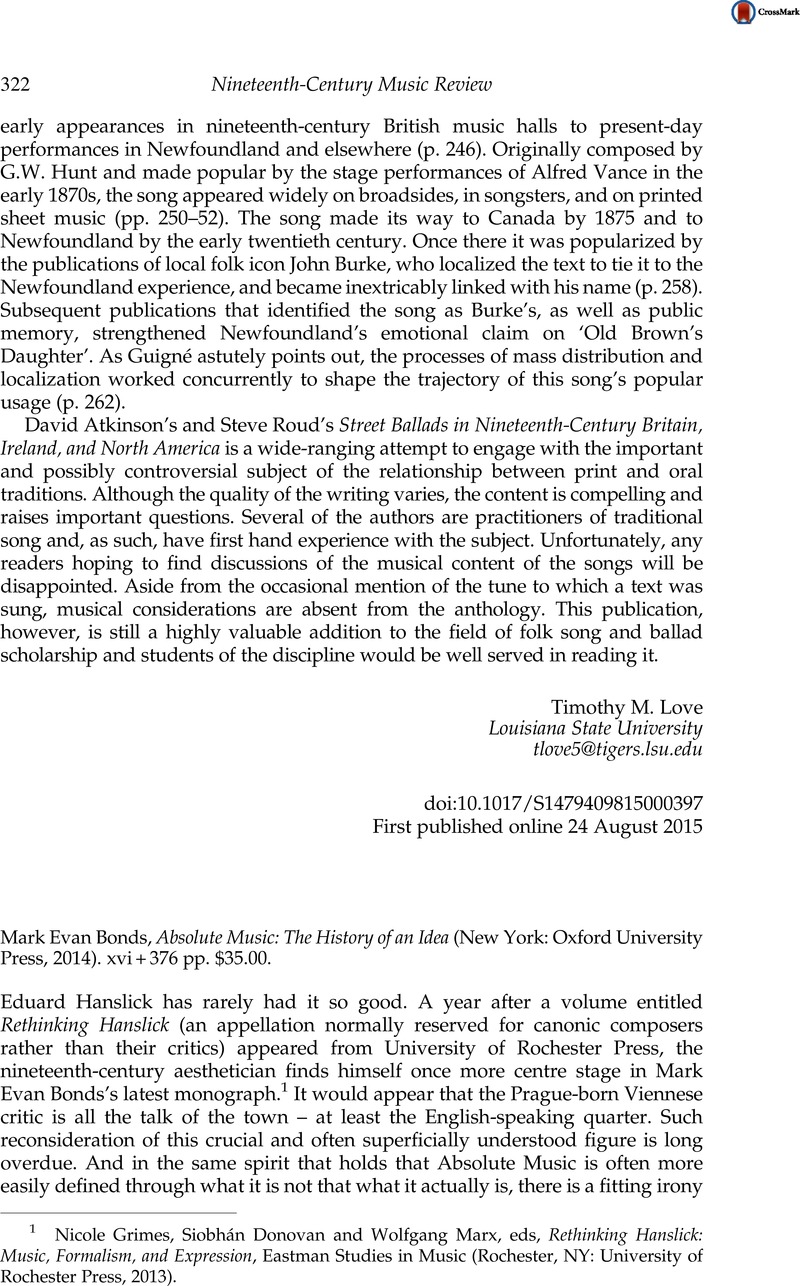No CrossRef data available.
Published online by Cambridge University Press: 11 August 2015

1 Grimes, Nicole, Donovan, Siobhán and Marx, Wolfgang, eds, Rethinking Hanslick: Music, Formalism, and Expression, Eastman Studies in Music (Rochester, NY: University of Rochester Press, 2013)Google Scholar.
2 Only the occasional metaphor or structural conceit appears (to my mind) contrived or tenuous, such as the use of the mythic Orpheus and semi-mythic Pythagoras as twin conceptual archetypes to which the music aesthetics of antiquity may invariably be reduced, or Bonds’s conclusion (p. 37) that Orpheus’s loss of Eurydice is related to music’s irrational pleasure identified by Plato’s Timaeus in the eponymous dialogue. Surely sight, not sound, is the guilty party here. Cautionary this tale may be, but not in the way Bonds tries to use it. On an editorial level, one might also note that the reference to ‘000’ on p. 55 could have been made into a more meaningful cross-reference.
3 I nevertheless feel that Bonds’s point is in danger of being undermined by his own discussion of the far earlier Platonic separation of music’s untrustworthy sensory apprehension from its intellectually derived essence as number (see particularly the discussion of Plutarch’s De musica, p. 30). This is hardly ‘essence as effect’, as the inclusion of this idea in the first part of the book would seem to suggest. Might we conclude that Hanslick is just another footnote to Plato?
4 Neubauer, John, The Emancipation of Music from Language: Departure from Mimesis in Eighteenth-Century Aesthetics (New Haven: Yale University Press, 1986)Google Scholar.
5 In fact Bonds often concedes more to this familiar narrative within the course of his book than the structural divisions and his strategic summaries of the overall argument might suggest. This is also an area, of course, which the author has treated perceptively and in great detail before, such as in the 1997 article ‘Idealism and the Aesthetics of Instrumental Music at the Turn of the Nineteenth Century’, Journal of the American Musicological Society 50 (1997): 387–420, the related 2006 monograph Music as Thought: Listening to the Symphony in the Age of Beethoven (Princeton: Princeton University Press, 2006), and to a lesser extent his 1991 Wordless Rhetoric: Musical Form and the Metaphor of the Oration (Cambridge, MA: Harvard University Press, 1991).
6 Dahlhaus, Carl, Die Idee der Absoluten Musik (Kassel: Bärenreiter, 1978)Google Scholar, Scruton, Roger, ‘Absolute Music’, The New Grove Dictionary of Music and Musicians, 2nd ed., 29 vols (London: Macmillan, 2001)Google Scholar, Chua, Daniel K.L., Absolute Music and the Construction of Meaning (Cambridge: Cambridge University Press, 1999)CrossRefGoogle Scholar. Later (p. 128) Bonds will himself undercut some of the charge by pointing out that such reification was provided by Wagner and Liszt in introducing the terms ‘absolute music’ and ‘programme music’.
7 Locke, John, An Essay Concerning Human Understanding, Bk III ch. x § 14Google Scholar; Thomas Hobbes, Leviathan, Bk I ch. IV and Bk IV ch. XLVI; Bacon, Francis, Novum Organum, bk I §§ LIX–LXGoogle Scholar.
8 This is apparent in the repeated reference (pp. 137 and 177) to Wagner’s not entirely coherent criticism of the Prussian Court in Potsdam with regard to a perceived timelessness of Athenian art, which makes little sense unless the celebrated Mendelssohn–Tieck production of Antigone is recognized as the attempted target.